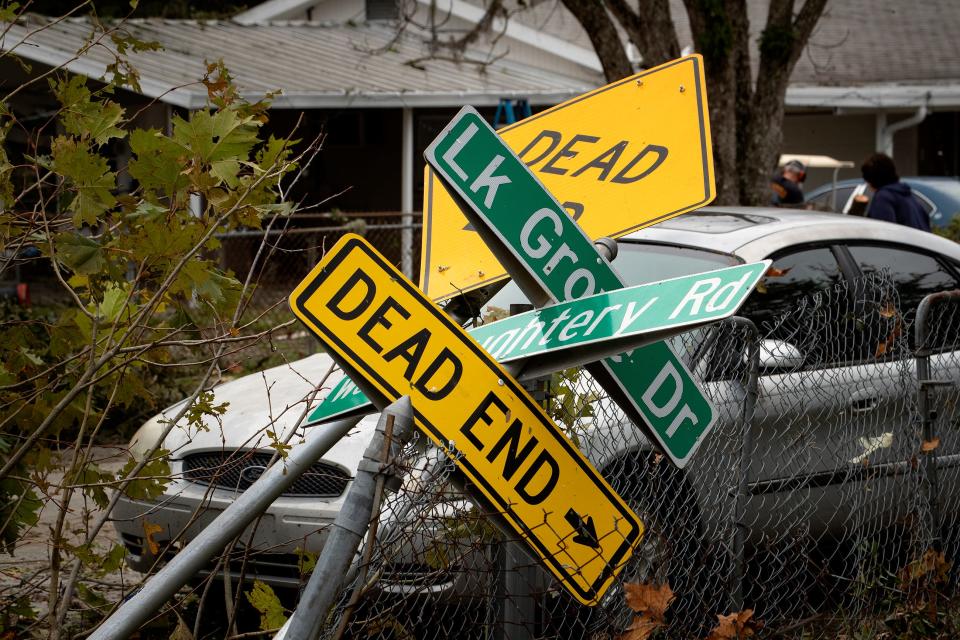'The threat is everywhere': What areas of Polk County are most vulnerable to hurricanes?
LAKELAND — Ahead of a busy hurricane season, it's impossible to predict what areas of Polk County are most likely to get the brunt of potential damage.
That's according to Paul Womble, the director of Polk County Emergency Management.
"The vulnerability from flood is everywhere," Womble said. "There's no way to predict in a thunderstorm, or certainly in a hurricane, especially, where those amounts of rain will fall. The threat is everywhere."

Every area of the county has been hit by storms before. In 2004, Hurricane Charley brought tornadoes which caused severe damage east of Haines City, Womble said. In 2012, Tropical Storm Debbie dropped 11 inches of rain over River Ranch. And in 2017, Hurricane Irma wreaked havoc across the county but especially in Lakeland, where Lakeland Electric suffered major infrastructure damage.
The 2022 hurricane season, which will run June 1 to November 30, will have at least 19 named storms and nine hurricanes, according to scientists at Colorado State University. Four of those hurricanes are predicted to be Category 3 or higher.
That's above average for a normal hurricane season, which has 14 named storms, seven hurricanes and three major hurricanes, according to NPR.
While Polk County typically fares better than coastal communities in the state, residents shouldn't get too comfortable, Womble said.
"We're inland. We don't have coasts, so we do not have storm surge impact like the coastal counties do. That's a good thing," Womble said. "[But] we still have really significant impacts from high winds, from floods, from rainfall flooding."
Flooding can be a major problem across the county, Womble said, especially in more low-lying areas. And a hurricane doesn't need to pass through for the threat of flooding to rear its head — all it takes is about four to five inches of rain over a couple of hours.
"The challenge becomes, and we've seen this in our past, when we get a lot of rain in a short amount of time, and that can happen even in a summer thunderstorm," Womble said. "Some parts of the county that based on topography and geology and drainage systems and all those things, if we get a lot of rain in a short amount of time, it's going to lead to flooding."
According to past Ledger reporting, flooding has caused serious issues in the county .
After Tropical Storm Elsa last year, Horney Park, just east of Florida Avenue on East Poinsettia Street, flooded after the neighborhood got three inches of rain and a drainage pump failed.
Hurricane Irma cost residents large portions of the Alligator Alley trail at Circle B Bar Reserve. Erosion of the trail began during the 2017 storm and has since continued, creating issues for long-term preservation of the trail.
Michael Williams, assistant chief of administration with the Lakeland Fire Department, manages the city's emergency response. He said the city keeps an eye on its low-lying areas for flooding risk during storm season, although he emphasized the city is well-prepared.
"Lakeland has a really robust infrastructure for stormwater runoff," Williams said. "We do a lot of preparation."
Williams said that historically, problem areas for Lakeland are the unincorporated areas in the western portion of the city. The city looks out for flooding, especially if there's been rain for several days leading up to a big storm.
Williams said he keeps a close eye on the area along New Tampa Highway between Brunnell Parkway and County Line Road.
"Typically that area we're talking about is called Winston Creek," Williams said. "We do keep an eye on that during storm season."
Both Womble and Williams expressed concern about RVs and mobile home communities, which can be vulnerable during hurricane season not because of the water, but because of the wind.
"We have tropical storm force winds or hurricane force winds," Williams said. "Those structures typically are not as secure as something that may be traditionally built."
Williams added that wind may be an even larger threat for the county overall than rain when it comes to the long-term effects of storms, hurricanes and tornadoes.
"Our vulnerability just lies in preparing for the winds, making sure we don't have debris in the yard and things are picked up and loose items are removed, those kinds of issues," Williams said. "Wind damage is probably our biggest concern. We do have flooding, but that typically resolves very quickly. I think the long-term effects are recovering from the wind damage and debris."
Womble emphasized that everyone in Polk County should have a plan for hurricane season. He suggested that everyone have enough food and medicine to last about a week and to have a plan in place for loss of electricity.
After Hurricane Irma, 80% of county residents lost power. Womble said he heard of some people going without power for up to 13 days.
Womble said that those that are either visiting the county in an RV or live in a mobile home should formulate plans to leave those vehicles, which may get "blown over." Womble said going to stable homes of friends and family should be Plan A and that residents should only go to the county's emergency shelters as a last resort.
"We don't wait until we have an impending storm to make preparations and plans," Williams said.
As storm season approaches, residents can visit www.polk-county.net for additional preparedness information. If a storm hits, the website will go to disaster mode and the latest updates will be shown on the homepage.
Maya Lora can be reached with tips or questions at mlora@gannett.com. Follow her on Twitter @mayaklora.
This article originally appeared on The Ledger: Hurricane season: What areas of Polk are most vulnerable to flood damage?

